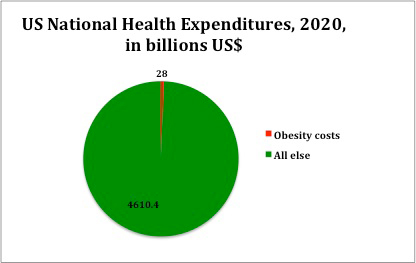More Obesity News from The Lancet
This is via Kevin Outterson at The Incidental Economist.
What does it take to lose weight?
Experts have underestimated how significant calorie reductions need to be in order to lose sustained weight. The new models call for daily caloric reductions in range of 30 – 40% for very significant weight loss (i.e., a 220 pound sedentary man reducing his 3000 calorie/day diet down to 1800 per day, in order to lose 44 pounds in 6 months).
What difference would it make?
Obesity-related health costs in the US will reach $28 billion in 2020. This sounds like a lot until you compare it to US national health expenditures in 2020:



The chart is surprising. And also hard to believe.
I agree with Ken. This is a surprisng result — at least to me — and it seems inconsistent with everything else I have read about the effects of obesity.
“The medical care costs of obesity in the United States are staggering. In 2008 dollars, these costs totaled about $147 billion (Finkelstein, 2009).”
CDC vs the Incidental Economist, who is correct?
@Simon: even if $147 is the correct number, that’s still tiny in comparison to everything else. To be sure $147B is 5.25 times as much as $28B, but consider the denominator of $4610B. Even at that rate, the point of the article seems made.